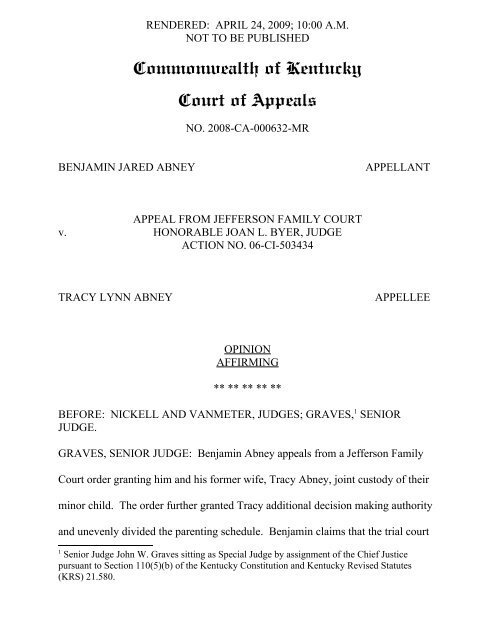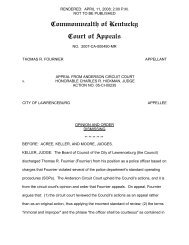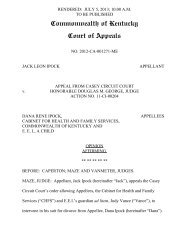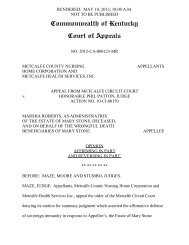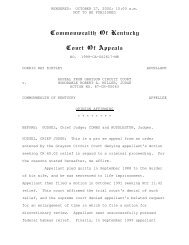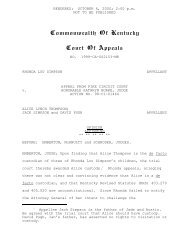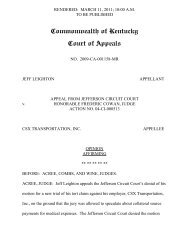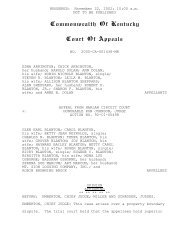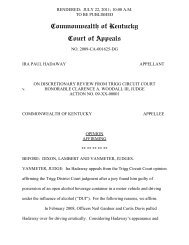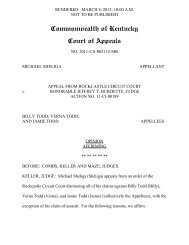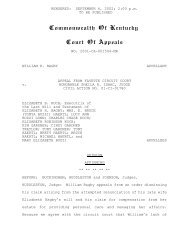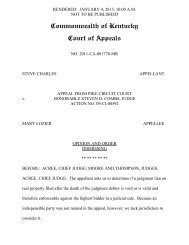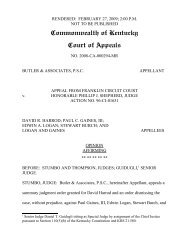Commonwealth of Kentucky Court of Appeals - Justia
Commonwealth of Kentucky Court of Appeals - Justia
Commonwealth of Kentucky Court of Appeals - Justia
Create successful ePaper yourself
Turn your PDF publications into a flip-book with our unique Google optimized e-Paper software.
RENDERED: APRIL 24, 2009; 10:00 A.M.<br />
NOT TO BE PUBLISHED<br />
<strong>Commonwealth</strong> <strong>of</strong> <strong>Kentucky</strong><br />
<strong>Court</strong> <strong>of</strong> <strong>Appeals</strong><br />
NO. 2008-CA-000632-MR<br />
BENJAMIN JARED ABNEY APPELLANT<br />
APPEAL FROM JEFFERSON FAMILY COURT<br />
v. HONORABLE JOAN L. BYER, JUDGE<br />
ACTION NO. 06-CI-503434<br />
TRACY LYNN ABNEY APPELLEE<br />
OPINION<br />
AFFIRMING<br />
** ** ** ** **<br />
BEFORE: NICKELL AND VANMETER, JUDGES; GRAVES, 1 SENIOR<br />
JUDGE.<br />
GRAVES, SENIOR JUDGE: Benjamin Abney appeals from a Jefferson Family<br />
<strong>Court</strong> order granting him and his former wife, Tracy Abney, joint custody <strong>of</strong> their<br />
minor child. The order further granted Tracy additional decision making authority<br />
and unevenly divided the parenting schedule. Benjamin claims that the trial court<br />
1 Senior Judge John W. Graves sitting as Special Judge by assignment <strong>of</strong> the Chief Justice<br />
pursuant to Section 110(5)(b) <strong>of</strong> the <strong>Kentucky</strong> Constitution and <strong>Kentucky</strong> Revised Statutes<br />
(KRS) 21.580.
abused its discretion by awarding Tracy four days in the weekly parenting schedule<br />
and only awarding him three days. Having concluded that Benjamin failed to<br />
properly preserve the issue for appeal, we affirm the decision <strong>of</strong> the Jefferson<br />
Family <strong>Court</strong>.<br />
Benjamin and Tracy were married on October 25, 2003. The couple<br />
lived in Louisville with their minor child and Tracy’s two children from a previous<br />
marriage. Tracy filed a Petition for Dissolution <strong>of</strong> Marriage with the Jefferson<br />
Family <strong>Court</strong> on September 1, 2006. On May 14, 2007, the family court entered a<br />
bifurcated Decree <strong>of</strong> Dissolution, leaving several contested issues to be resolved.<br />
The family court ordered the parties to enter mediation to resolve the remaining<br />
issues, including custody <strong>of</strong> their minor child. After mediation was unsuccessful,<br />
the family court appointed Dr. Paula Berry, a child psychologist, to perform a<br />
custody evaluation.<br />
At trial, Dr. Berry recommended that Benjamin and Tracy share joint<br />
custody <strong>of</strong> their child. Dr. Berry recommended that the parenting schedule remain<br />
equally divided, as it had been during their period <strong>of</strong> separation, and noted that the<br />
couple agreed that the schedule worked well. Dr. Berry also recommended that<br />
Tracy be given additional decision making abilities based on Benjamin’s history <strong>of</strong><br />
uncooperative behavior and his excessive punishments <strong>of</strong> Tracy’s older children.<br />
On January 18, 2008, the family court entered its findings <strong>of</strong> fact,<br />
conclusions <strong>of</strong> law and judgment, in which it found that joint custody would be in<br />
-2-
the best interest <strong>of</strong> the child. As recommended by Dr. Berry, Tracy was given the<br />
final decision making authority in the event <strong>of</strong> an impasse concerning issues <strong>of</strong><br />
healthcare, education, and religion. In addition, the family court split the custodial<br />
time by giving Tracy four days per week and Benjamin three days per week.<br />
Benjamin filed a <strong>Kentucky</strong> Rules <strong>of</strong> Civil Procedure (CR) Rule 59 motion asking<br />
the family court to reconsider its custody award. The motion was not timely filed<br />
and was thus denied. This appeal follows.<br />
In his prehearing statement, Benjamin indicated the only issue to be<br />
raised on appeal was the award <strong>of</strong> joint custody without joint decision-making<br />
authority. CR 76.03(4)(h) requires an appellant to file “[a] brief statement <strong>of</strong> the<br />
facts and issues proposed to be raised on appeal . . . .” within twenty days <strong>of</strong> filing<br />
the notice <strong>of</strong> appeal. See Sallee v. Sallee, 142 S.W.3d 697, 698 (Ky. App. 2004).<br />
CR 76.03(8) states, “[a] party shall be limited on appeal to issues in the prehearing<br />
statement except when good cause is shown the appellate court may permit<br />
additional issues to be submitted upon timely motion.” In this case, Benjamin did<br />
not submit a request to present additional issues.<br />
Benjamin claims that the order must be reversed because the court<br />
awarded joint custody without joint decision-making authority. However, a review<br />
<strong>of</strong> Benjamin’s brief reveals that the only issue raised was the unequal division <strong>of</strong><br />
parenting time. Benjamin claims that the division constituted an abuse <strong>of</strong><br />
discretion because the family court had no factual basis for its decision. The<br />
division <strong>of</strong> parenting time was neither raised in the prehearing statement nor by a<br />
-3-
timely motion to submit additional issues. Therefore, we conclude that the matter<br />
was not properly preserved for our review.<br />
In any event, a review <strong>of</strong> the record indicates that Benjamin would not<br />
have prevailed on the issue submitted in the prehearing statement or the issue<br />
presented in his brief. In Fenwick v. Fenwick, 114 S.W.3d 767 (Ky. 2003),<br />
overruled on other grounds by Frances v. Frances, 266 S.W.3d 754 (Ky. 2008),<br />
and Pennington v. Marcum, 266 S.W.3d 759 (Ky. 2008), the Supreme <strong>Court</strong> <strong>of</strong><br />
<strong>Kentucky</strong> concluded that joint custody and equal decision making power are not<br />
the same. The <strong>Court</strong> stated, “equal decision-making power is not required for joint<br />
custody, and parties or trial courts are free to vest greater authority in one parent<br />
even under a joint custody arrangement.” Id. at 776. Benjamin claims that the trial<br />
court did not have a factual basis for the award. We disagree. Dr. Berry<br />
recommended that Tracy receive certain decision-making authority. Dr. Berry<br />
expressed concerns about Benjamin’s uncooperative nature as well as his history <strong>of</strong><br />
excessive punishment. Based upon Dr. Berry’s testimony, we hold that the trial<br />
court did not abuse its discretion.<br />
Further, we hold there is no merit in Benjamin’s claim that the trial<br />
court erred by awarding Tracy more visitation time than he received. While Dr.<br />
Berry recommended that the family continue the current parenting schedule,<br />
Benjamin’s history <strong>of</strong> excessive punishment and uncooperative nature certainly<br />
provide the trial court with a reasonable basis for its award <strong>of</strong> parenting time.<br />
-4-
Although the record reflects a factual basis for the trial court’s<br />
findings, we must base our decision on Benjamin’s failure to properly preserve his<br />
issue for appeal. Accordingly, we affirm the decision <strong>of</strong> the Jefferson Family<br />
<strong>Court</strong>.<br />
ALL CONCUR.<br />
BRIEF FOR APPELLANT:<br />
Louis I. Waterman<br />
Louisville, <strong>Kentucky</strong><br />
BRIEF FOR APPELLEE:<br />
Mark W. Dobbins<br />
Sandra F. Keene<br />
Louisville, <strong>Kentucky</strong><br />
-5-


